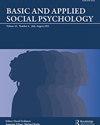To Apologize or Justify: Leader Responses to Task and Relational Mistakes
IF 1.8
3区 心理学
Q2 PSYCHOLOGY, SOCIAL
引用次数: 4
Abstract
Abstract Leadership roles are complex, creating an environment where leaders are likely to make mistakes that result in negative outcomes. We shift the conversation in the literature from examining the effectiveness of mistake responses toward exploring why leaders use different mistake recovery methods. We employ an online experimental method to distinguish between task and relationship mistakes for leaders and suggest that different attributions are made for these two types of mistakes (Study 1). We found that task mistakes are viewed by leaders as more specific and less personal, and that relationship mistakes are viewed as more global, describing the leader’s stable characteristics rather than a specific event. From these findings, we predict that leaders are more likely to apologize for task mistakes and are more likely to justify their relationship mistakes rather than admit wrongdoing for them. We find support for these predictions using a mixed methods approach, employing a laboratory experiment (Study 2) and a critical incident method surveying a panel of leaders (Study 3). As such, this paper extends our understanding of the mistake recovery process for leaders by demonstrating that 1) leaders’ relationship mistakes are viewed as more globally representative of the leader than task mistakes, and 2) leaders are more likely to apologize for task mistakes but more likely to justify relationship mistakes. Relational and task mistakes, however, were not found to be different in regard to their ambiguity or the extent to which they were viewed as a mistake.道歉或辩护:领导者对任务和关系错误的反应
摘要领导角色是复杂的,在这种环境中,领导者很可能会犯错误,从而导致负面结果。我们将文献中的对话从研究错误反应的有效性转向探索领导者为什么使用不同的错误恢复方法。我们采用在线实验方法来区分领导者的任务错误和关系错误,并建议对这两种类型的错误进行不同的归因(研究1)。我们发现,领导者认为任务错误更具体,不那么个人化,而关系错误则更具全局性,描述的是领导者的稳定特征,而不是特定事件。根据这些发现,我们预测,领导者更有可能为任务错误道歉,更有可能为他们的关系错误辩护,而不是为他们承认错误。我们使用混合方法,采用实验室实验(研究2)和调查领导小组的关键事件方法(研究3),找到了对这些预测的支持。因此,本文通过证明1)领导者的关系错误比任务错误更具全球代表性,2)领导者更有可能为任务错误道歉,但更有可能为关系错误辩护,从而扩展了我们对领导者错误恢复过程的理解。然而,在关系错误和任务错误的模糊性或被视为错误的程度方面,并没有发现它们的不同。
本文章由计算机程序翻译,如有差异,请以英文原文为准。
求助全文
约1分钟内获得全文
求助全文
来源期刊

Basic and Applied Social Psychology
PSYCHOLOGY, SOCIAL-
CiteScore
4.50
自引率
12.50%
发文量
7
期刊介绍:
Basic and Applied Social Psychology (BASP) emphasizes the publication of outstanding research articles, but also considers literature reviews, criticism, and methodological or theoretical statements spanning the entire range of social psychological issues. The journal will publish basic work in areas of social psychology that can be applied to societal problems, as well as direct application of social psychology to such problems. The journal provides a venue for a broad range of specialty areas, including research on legal and political issues, environmental influences on behavior, organizations, aging, medical and health-related outcomes, sexuality, education and learning, the effects of mass media, gender issues, and population problems.
 求助内容:
求助内容: 应助结果提醒方式:
应助结果提醒方式:


